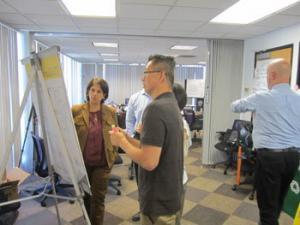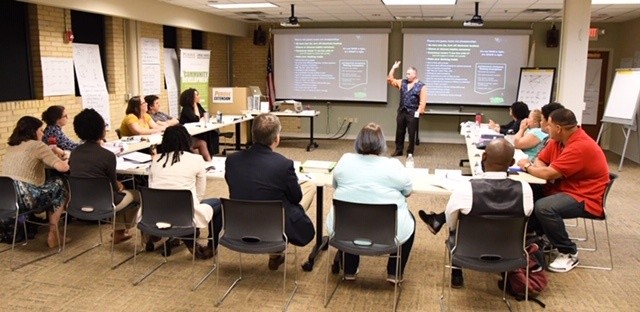
WHY Invest In Professional Facilitation Training?
Professional facilitation training increases confidence and effectiveness when leading meetings, workshops, and presentations. Most important, the right facilitation skills lead to higher quality, consensual deliverables that help you and your organization succeed.
WHY you should use structured facilitation in your meeting design…
and why it is important.
 The simplest explanation for structured meetings is meeting design—the series of questions that help a group get DONE. For example, if your deliverable is a marketing plan, the unstructured approach asks “What should be in the marketing plan?” People will then discuss (and sometimes argue) for the duration of the meeting.
The simplest explanation for structured meetings is meeting design—the series of questions that help a group get DONE. For example, if your deliverable is a marketing plan, the unstructured approach asks “What should be in the marketing plan?” People will then discuss (and sometimes argue) for the duration of the meeting.
Structure saves time and money because it suggests that “Y” is a function of “X.” For complex topics, there are big “X”s and little “x”s. You have seen a basic mathematical expression: Y = f (X) + (X) + (x) + (x)
Structure forces the meeting designer to prepare in advance the specific questions and optimal topical flow for each question (“X”), one at a time. When results are aggregated, the complete view develops, built on shared understanding rather than rambling discussions. In short, you can’t be effectively agile if you don’t have the meeting design and facilitation tools to help your participants agree on clear and actionable results.
For example, to solve global hunger, you can’t ask “What can you do to solve global hunger?” because the question is too broad. You are asking for the “Y.” We know that hunger is a function of food creation, food distribution, food storage, nutrition absorption, etc. Therefore, ask for the “X” such as “What can we do to increase food storage capacity in coastal Somalia for children 12 years old and younger?” (note the tightened scope).
Structure provides the HOW TO get a group from the meeting introduction to the meeting conclusion. Good facilitators struggle because they understand the ‘soft skills’ of facilitation but lack the structure and meeting design to build consensus around complex business issues and topics. Without optimal meeting design you will witness . . .
- Meetings that go off track and become rambling forums for the loudest voices in the room
- Participants that disengage (or worse, stare at mobile devices)
- Meeting cultures where people show up unprepared or disinterested
- Rising conflict with negative attitudes, dysfunctional behavior, and political resistance
You should care. Because, if you personally lead meetings, teams, and groups of people, designing your meetings with a structured technique will give you the reputation of a humble, servant leader. Of course being humble does not mean thinking less of yourself, it means thinking of yourself less often.
HOW structured facilitation immediately benefits you…
and why it is important.
 MG RUSH Professional Facilitation gives you a holistic approach for structuring the input of varying perspectives, forging a consensual outcome that everyone will own and support. With consensus, as opposed to voting, you develop a win-win situation. Our structured meeting design helps you win and it begins by teaching you HOW TO THINK.
MG RUSH Professional Facilitation gives you a holistic approach for structuring the input of varying perspectives, forging a consensual outcome that everyone will own and support. With consensus, as opposed to voting, you develop a win-win situation. Our structured meeting design helps you win and it begins by teaching you HOW TO THINK.
Based on empirical research and many hours of intensive field testing, MG RUSH Professional Facilitation (approaches and tools) reflects the modern organization: distributed, electronic, and multi-cultural, with a heavy emphasis on decision quality and project management excellence.
More effective meetings depend on improving three areas of your behavior, namely:
- WHY — Leadership training ensures that we begin with the end in mind. WHY we’re meeting equates with what does DONE look like? The best facilitators in the world will fail miserably if they don’t know where they are going. The worst facilitators still succeed when the deliverable is clear and it has an impact on the quality of life of meeting participants.
- WHAT — Once it is clear where we are going, facilitation skills make it easier to know WHAT to do to make a meeting successful. Unfortunately, we have developed poor muscle memory over the years. Some behaviors need to be ‘unlearned’ before new behaviors are embraced. The only way to change such behaviors is through practice and immersion. Active participation and practice will work at instilling effective and facilitative behaviors.
- HOW — Even a great facilitator who knows where they are going (ie, What DONE looks like) still needs meeting design. They need to know HOW they are going to build consensus and get a group of people from the meeting Introduction to the Conclusion. While there is more than one right answer, there is one wrong answer — if the meeting leader does not know HOW they are going to do it.
When you take a trip, for example, first you need to know WHERE you are going (and of course, WHY you are going there). HOW you get there reflects numerous options and multiple criteria. (ie For short-distance trips, most of us could take a motorized vehicle, walk, ride a bicycle, etc.). Our structured meeting design is NOT about singing Kum Bay Yah, but rather, accelerating information gathering, driving meeting results through disciplined analysis, and improving the quality and transparency of decision-making.
The MG RUSH Professional Facilitation technique works and, based on alumni feedback, it works immediately. Read some of the testimonials, including those from recent classes (by our standards, the most important). Every day we are helping thousands of alumni run more effective meetings, thus helping them exceed personal, product, and project objectives faster since they understand HOW TO think when leading people from various cultures holding assorted beliefs and values that may seem contrary. While not for the faint-hearted, you will leave our class inspired and competent, with skills that immediately benefit your career and your organization.
Your Next Step…
To reserve a space, arrange for a private class, or inquire about this and other courses, call us at (630) 954-5880 or
Benefits of Embracing Professional Facilitation
When organizations support skilled and facilitative leadership for product development, project management, process improvement, and so on, they are allocating human capital to ensure the success of their single most expensive investment: meetings.
- When context is carefully managed, teams are free to focus on greater quality and value—quality being defined as satisfying customer expectations and value being defined as exceeding customer expectations.
- When staff are treated like partners and collaborators, commitment and motivation increases.
- When stakeholders’ ideas are sought, meetings become collaborative, innovative, and vibrant.
You benefit
- By earning respect and recognition for leading better meetings
- By increasing your leadership consciousness, facilitation competence, and meeting design confidence
- By learning how to modify and adapt proven agendas, procedures, and tools for information gathering, analyzing, and decision-making
Your New Skills Benefit Everyone
Your organization benefits
- By expediting the output of highly sought deliverables
- By improving the culture and team spirit while enabling outstanding individual performances
- By reducing the cost of omissions and issues subject to normal oversight
- By reducing the cost of wasted meetings and wasted time in meetings
Your community benefits
- By encouraging shared planning efforts to improve the distribution of resources
- By improving volunteerism
- By increasing decision transparency
- By solidifying shared ownership
All society benefits
- By increasing eco-effectiveness through reducing wasted time and resources
- By improving the likelihood of win-win scenarios
- By motivating hitherto unused or underused intellectual capacity
Some features of MG RUSH Professional Facilitation Training:
- Access to a growing body of meeting designs, field-tested and scripted
- Certification plus CDUs. FAC CLPs. SAVE CVS PDUs. CEUs
- Dozens of hours of practice and daily personal feedback, including five written pages
- Extensive Reference Manual that covers a huge variety of facilitated sessions
- Facilitator skills, group dynamics, managing conflict, meeting preparation and controls, online meetings, and visual aids
- Integration with various session types such as project management, problem-solving, brainstorming, look backs, and others.
- Learning to shift responsibilities and action plans from you to team members.
- Online and hybrid tips, tricks, and riffs to increase remote project member enthusiasm.
- Ongoing updates to your Professional Facilitation resources, as active facilitators—we practice what we preach!
- Professional development through our alumni resources and specialized facilitation classes
- Proven tips to transform cultures where participants show up unprepared or disinterested
